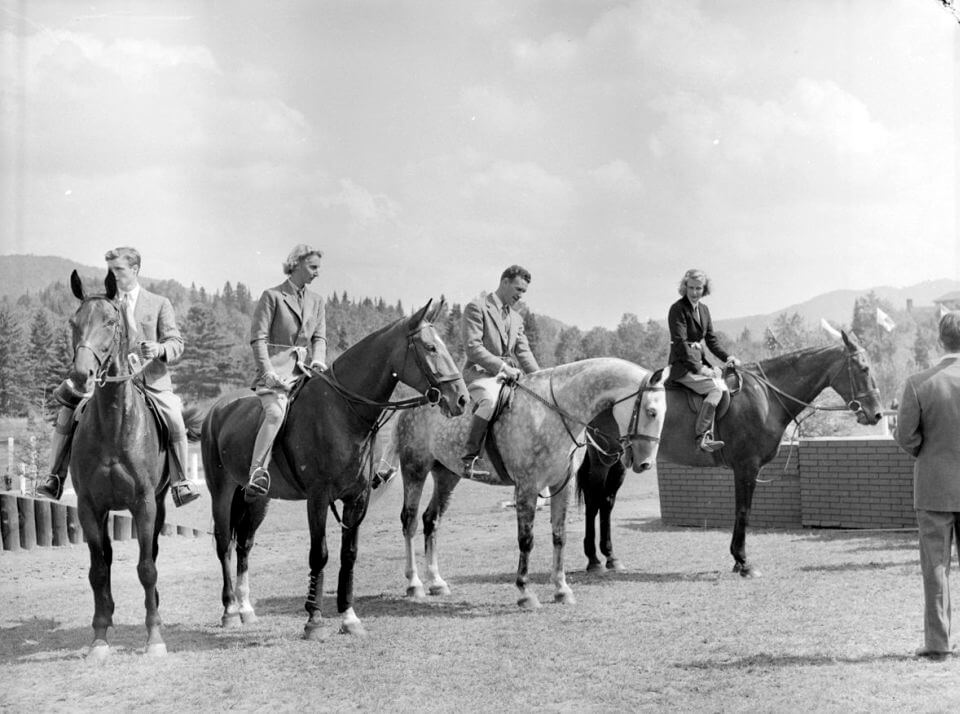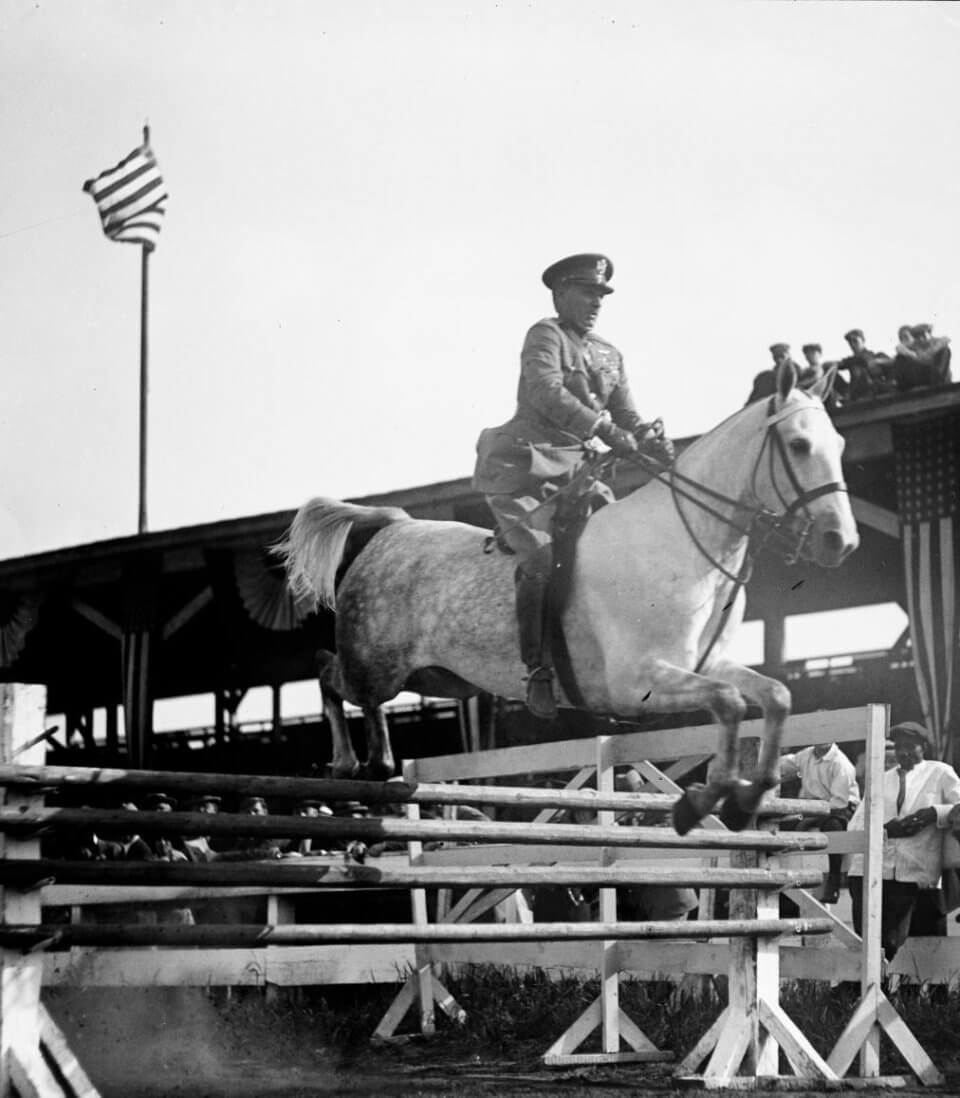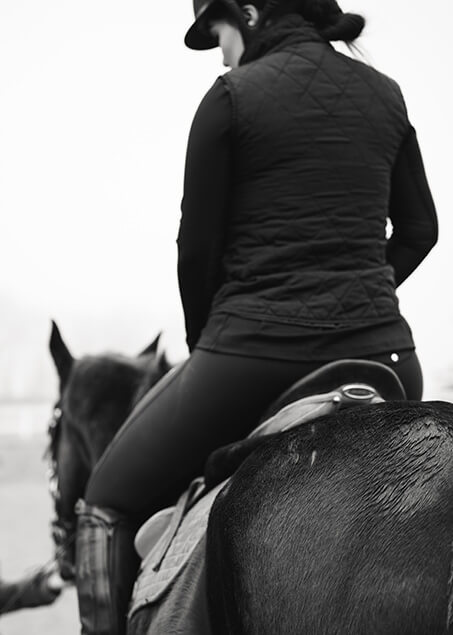
I watched the edited clips of Katie Prudent’s recent clinic, and my first thoughts were, “That doesn’t look that bad.”
It looked like many of the trainers I had growing up. They were all like that, rough, tough on us, and using what I hope was hyperbole about the ways we should treat our horses. But then I remembered the second part of that – I freakin hated it. I hated the way those instructors yelled at us. I hated being belittled when I was trying my best, or because I just couldn’t hear the instructor when it feels like they are a mile away on the other side of a windy arena.
Why were instructors like this? Why did they make me feel like riding wasn’t meant to be fun, it was meant to be character building, aka painful?
Obviously I survived it, and many others did, too. But it brought up so many feelings about these types of trainers… Let’s start with last week – I’ll explain what happened at the clinic.
The Katie Prudent Controversy
Last Saturday, January 13th, 2024, Katie Prudent taught a United States Equestrian Federation clinic for 11 riders, teens and young adults. The event was broadcasted on USEF’s streaming services, and a few days later, a video of some choice clips came out. Katie’s rough teaching style was on display for the world. (see below for transcript.) The clip video is about 2 and a half minutes, compiled from a much longer session (and one would assume these are the worst parts.)
In the video, she’s shown instructing students, sometimes in a completely calm, even tone, and other times louder. She is sometimes frustrated with the students, and advocates for hitting the horses with the crop as discipline, including that animal activists don’t understand, and says she’d flip a horse over that wouldn’t stop. Towards the end, there’s a confusing sequence where she seems to keep changing her mind on whether the riders should stop on a line or canter left.
I don’t know if the video will continue to stay up, so I’m including the transcript.
Transcript
- “Look at me when I’m talking to you – Look at me, Carly, when I’m talking to you. Carly, look at me.”
- “I don’t want to look over and see you being jerked like you’re a little weakling.”
- “Where’s Anne… so how to shorten the stirrups is another hour lesson… and I’m not doing it today because I don’t have time, but when there is time, that’s got to be addressed. No one does it right anymore.”
- “Release him – RELEASE HIM.”
- “Whoa, whoa, whoa, got to be more effective. Right now, he just wants to be left alone – but too bad for him.”
- ‘Now I have this thing with my stick, and I call it smack and back. Now when a horse does a disobedience, the reason we have a stick is to use it correctly. And horses need it. All this animal rights activists who know nothing about training horses, they need a good licking sometimes.”
- “Come on, come on, I don’t go in for circling.”
- “Right, don’t you dare turn that corner. You crash him into that fence rather than letting him turn.”
- “I personally would be flipping him over backwards. He wouldn’t dare go around that corner with me.”
- “You’re a little weak. Here, you’re weak here.” (with gesture to head)
- “Where are you going? Where are you going? Go do it again, I want you to stop on a line. I don’t want you to canter the turn”
- “Up, up, UP.”
- (as horse jumps and stops on the line) “Canter left, go left, keep going. Carly, listen to me, keep going. Tune into my voice, think.”
- (Horse jumps and turns left) “Stop on a line. See this, as a group, as a group, you guys lack discipline. 20 times we’ve stopped on a line Ainsley. Come to this again.”
- “Was he supposed to turn left? You guys know what? Either you don’t listen or you’re bird brains. Start again. I want a left turn there.”
This clip went viral, with very mixed opinions. Some where very angry at Prudent and the USEF for promoting this. They called it bullying. Many commented that the horses and riders looked stressed, and this was how to make horses hate jumping.
Others defending Prudent, saying that this is how good riders are made. This is how they learned, and riders today are soft.
Militaristic Teaching Style
Once upon a time, my riding instructors were like this, too. As I said, I didn’t even think it was bad, this was the way I was taught. I wasn’t even being taught by an Olympic riding like Prudent either, I was being taught at small town, up-down, no name barns. We didn’t even go to big shows.
They were rough, they were tough, and lessons were filled with sarcasm, eye rolls, and jabs at the state of our riding. But at the time, this seemed totally normal. All barns were like this. I remember when I was a working student for one such barn, and a parent was discussing her daughter’s riding with me. She was pleased that my boss was so tough on her, because she advanced so much.

Much of the older generation of riders learned this way. The militaristic teaching style was extremely common. You were expected to do the drills, stay disciplined, and give your complete obedience to the instructor. There’s likely a very good reason for this – from the 1900s and slowly dropping off towards 1950’s, riding was taught by cavalry men. The military refined riding styles, and then these cavalry men would go on to teach civilians. These civilians, would go on to teach how they were trained, in the militaristic style.
This style produced tons of great riders who competed in internationally. They were respected for their accomplishments, and many of them continued the cycle of hardness to produce greatness. It was normal. But now that we are a few generations removed from the cavalry, it does feel like these trainers are of a different era. Many of today’s trainers are more like the favorite teacher in school – empathic, and creative in their methods. By comparison, the old era of trainers look like dinosaurs.
The modern world of riding expects respect. Programs like Safe Sport were formed to protect vulnerable young riders. The ease of recording allows everything to be put out for everyone to see, showing the world exactly what goes on behind closed doors (including the barn doors). What might have been he said, she said, in prior times can now be factual by having a cell phone. The morality of every disagreement can be determined by the jury of the internet.
But harsh teaching methods, while they may be tough to watch, are not illegal. Some riders do thrive by being pushed. Lots of people desire to be the absolute best, and they want that kind of motivation. Many other sports, especially those that are male dominated, are well known for having tough coaches. It’s expected that football players don’t get babied. Baseball players are going to be yelled at. Isn’t it normal for coaches to be tough with their students?
From the Rider’s Perspective
Tons of us had these types of trainers growing up. Some people thrived under it, eager for the push, eager to learn. Others, while they might have been eager to learn, felt it was too abrasive. Riding lessons would make them cry, and they begin to dread coming to the barn. They had loved horses, but the barn was no longer a safe space. Countless riders faded away, burned by their negative experiences, possibly never to ride again.
How often have you seen a friend, colleague, or random internet stranger, asking for help because they don’t know if they should leave their barn? They feel like their trainer is either mean or disrespectful to them, but they will definitely go to Nationals, Indoors, Congress or the Quidditch World Cup if they just stick with this awful person. What should they do? How can they feel good about their own riding again?
It’s super common for trainers to be mean to their clients, and it’s an attitude that I do not understand.

Now, understand that there’s always going to be people who are unhappy, and sometimes it has nothing to with any perceived slight. Sometimes people just don’t get along. Sometimes it’s just a bad services fit – the rider wants a certain kind of program that the trainer doesn’t offer. A trainer can’t continually alter their program for every single client, there has to be some consistency to what they are teaching. Not agreeing on the service level or simply not getting along does not mean there’s something wrong with a trainer. There’s always two sides to the story, and a rider might not be honest with herself about her grievance.
But there’s a difference between a mismatch of trainer and rider, including a trainer who is a bit tougher than the rider is used to, and a trainer who is just well, a bit rude. Some of these trainers got into horses because they love horses, but dislike people, and it shows.
I’ve had the feeling like I was being picked on in lessons. I’ve heard the trainer belittle my horse. I’ve heard my trainers insult other riders or horses. It’s like they never learned to keep their inside voice to themselves – or they are surrounded by so many “yes men,” that they have no issues letting their blunt opinions out into the world. There was a level of disrespect that I did not appreciate, and I showed it by walking away. I’m pretty tough and willing, and I do like to be challenged, but I draw the line at being insulting while I’m trying to learn. I’m not interested in giving these types of trainers money.
Prudent had a separate controversy of her own several years back. She was interviewed about the state of show jumping today, and it received immediate internet backlash. While she brought up interesting points, it was hard to look past her contempt for the average rider. Knowing her thought process from this interview puts her teaching at the clinic in perspective. This is completely on brand for her.
It’s Your Choice
I remember one of the first times I actually stopped my lesson. My trainer was getting frustrated because I wasn’t getting it, and I literally stopped my horse, and walked over to her. “I don’t get it, can you please help me understand?”
I don’t think this happens very often, as my trainer was a little taken aback, but she explained it again. After that, the feeling was kind of addictive. If there was something I didn’t get, I just stopped and asked for it to be explained. She was a tough teacher, but she was still a kind person. She took riding very seriously, and I think she appreciated me trying to clarify what was going on.
It feels wrong to question your trainer, but the truth is, you actually can. You’re (likely) a grown up, you deserve respect, and you’re allowed to say, “I don’t feel comfortable,” “Why are you saying that?,” or just flat out, “No.” I’m not saying that it will end up peaches and roses and then everyone claps, but you don’t have to just accept someone being rude to you. Trainers aren’t gods, they are just people.
Prudent’s teaching might have rubbed many the wrong way, but the good news is, you don’t have to ride with a trainer like that. You can find a new one. To all the riders expressing their frustrations online about their trainers, you don’t have to stay there. It sounds overly simple, but you really can just leave. If a trainer isn’t making you happy to to come to the barn every time, eager to ride, they probably aren’t the right trainer for you. Does it matter if you’re competitive if you’re not getting fulfilment out of riding in the first place?
But it does go the other way, too. You have to respect that some people do want trainers that are tough. Many people thrive under that kind of discipline. If you want a trainer that’s going to push you to the top, maybe you do need a trainer like Prudent. We’re all allowed to have our personal preferences of what works for us. (Although I want to make it clear, I do think she’s out of line for suggesting riders use their crops to discipline their horse. I’m pretty sure the “flip him over” comment was hyperbole, to suggest that riders really need to make their horses stop, that’s a pretty basic ask. As far as I know, she’s never actually flipped a horse over.)
I honestly have no personal thoughts on USEF, or Katie Prudent or even the state of show jumping in the US. It’s all so far out of the scope of what I do these days, they are more like a distant planet, and we are just all orbiting the same sun. What I care about is having amazing experiences with my horse. I care about being the best horsewoman I can possibly be. And I care about my fellow riders, the people I’m hanging out with at the barn, talking to online, and going out on hacks with. They might have big showing goals, or just want to hit the trails, but in the end, they just want to spend a great day at the barn. I want those riders to know that trainers like Katie Prudent do exist, but if you don’t want to ride with them, you don’t have to. There’s a crazy amount of riding instructors and trainers out there, you don’t have to settle for one that doesn’t match what you want to do.
Find a trainer that you mesh with. If you’re not a fan of the trainers from a different era, don’t give them money. Based on Prudent’s comments, there may not be a market for them anymore. They’ll either adapt to the new world, or they’ll go the way of the dinosaurs: extinct.
